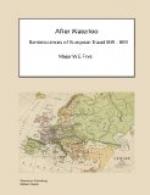You may perhaps be unwilling to let me depart from Rome without some information as to theatricals. With regard to these, Rome must hang down her head, for the pettiest town in all the rest of Italy or France is better provided with this sort of amusement than Rome. There is a theatre called Teatro della Valle, where there is a very indifferent set of actors, and this is the only theatre which is open throughout the year. Comedies only and farces are given. The theatres Aliberti and Argentino are open during the Carnaval only. Operas are given at the Argentino, and masquerades at the Aliberti. But in fact the lovers of Operas and of the Drama must not come to Rome for gratification. It is not considered conformable to the dignity and sanctity of an ecclesiastical government to patronize them; and it is not the custom or etiquette for the Pope, Cardinals or higher Clergy ever to visit them. The consequence is that no performer of any consideration or talent is engaged to sing at Rome, except one or two by chance at the time of the Carnaval. In amends for this you have a good deal of music at the houses of individuals who hold conversazioni or assemblies; in which society would flag very much but for the music, which prevents many a yawn, and which is useful and indispensable in Italy to make the evening pass, as cards are in England.
I intend to stop several days here on my return from Naples, for which place I shall start the day after to-morrow having engaged a place in a vettura for two and half louis d’or and to be spesato. I am not to be deterred from my journey by the many stories of robberies and assassinations which are said to occur so frequently on that road.
By the bye, talking of robberies and murders, a man was executed the day before yesterday on the Piazza del Popolo for a triple murder. I saw the guillotine, which is now the usual mode of punishment, fixed on the centre of the Piazza and the criminal escorted there by a body of troops; but I did not stop to witness the decapitation, having no taste for that sort of pleasuring. This man richly deserved his punishment.
[84] These lines are from Voltaire’s Henriade,
a poem which no Frenchman
reads nowadays, but that Major
Frye could quote from memory. The
correct reading of the first
verse is: Des pretres fortunes, etc.
(Henriade, canto iv.
ed. Kehl, vol. x, p. 97.)—ED.
[85] Horace, Sat., 1, 9, 4.—ED.
[86] Lady Elizabeth Hervey, second wife of William,
fifth Duke of
Devonshire (1809); died March,
1824.—ED.
[87] A singular slip of the pen; Frye must have known
that the equestrian
statue is a Roman work—ED.
[88] Ariosto, Orlando Furioso, xxxiii, 2, 4.—ED.
[89] See Lucian, Imag., iv; Amores, xv, xvi.—ED.
[90] Major Frye’s description is incorrect in
many particulars, on which it
seemed unnecessary to draw
attention.—ED.




